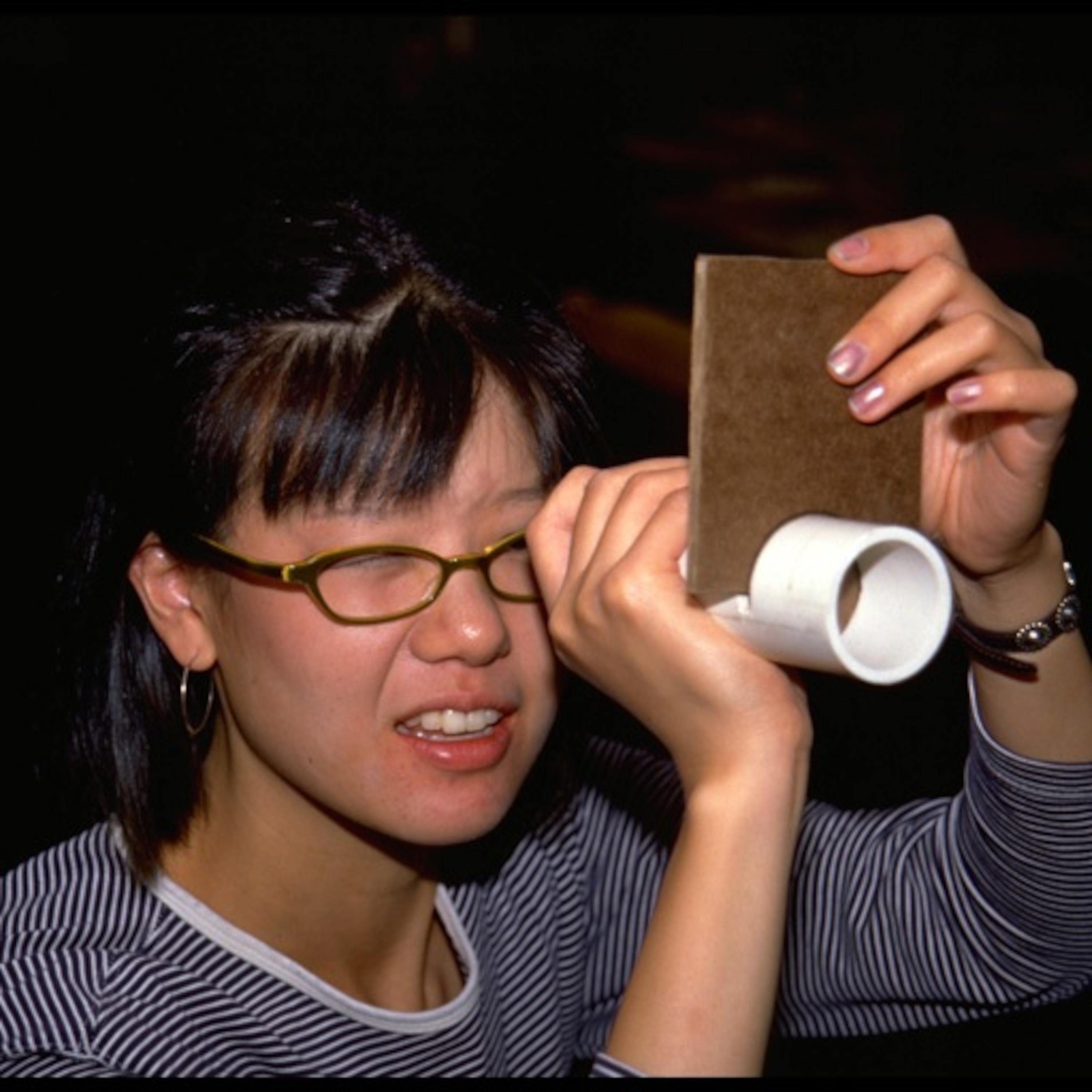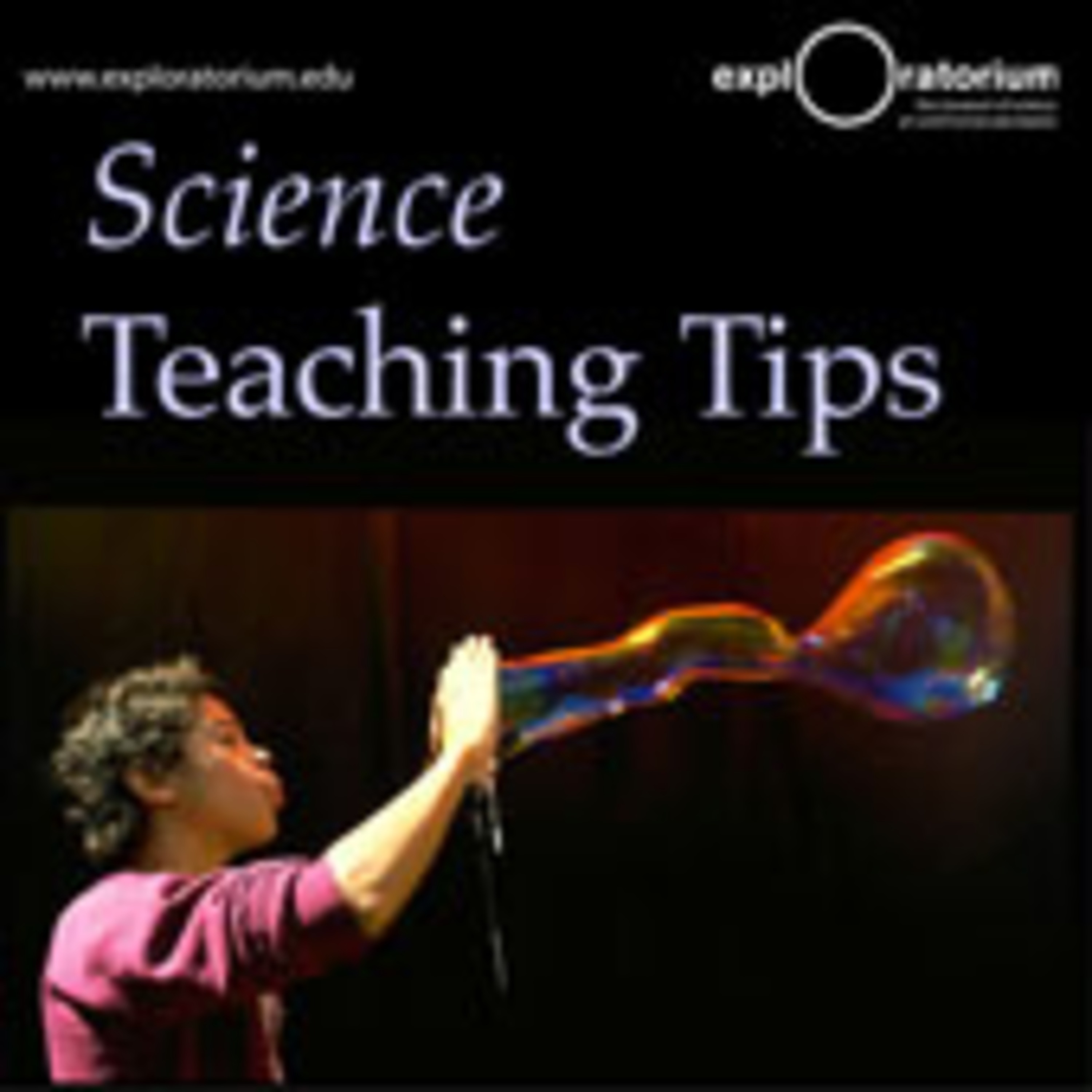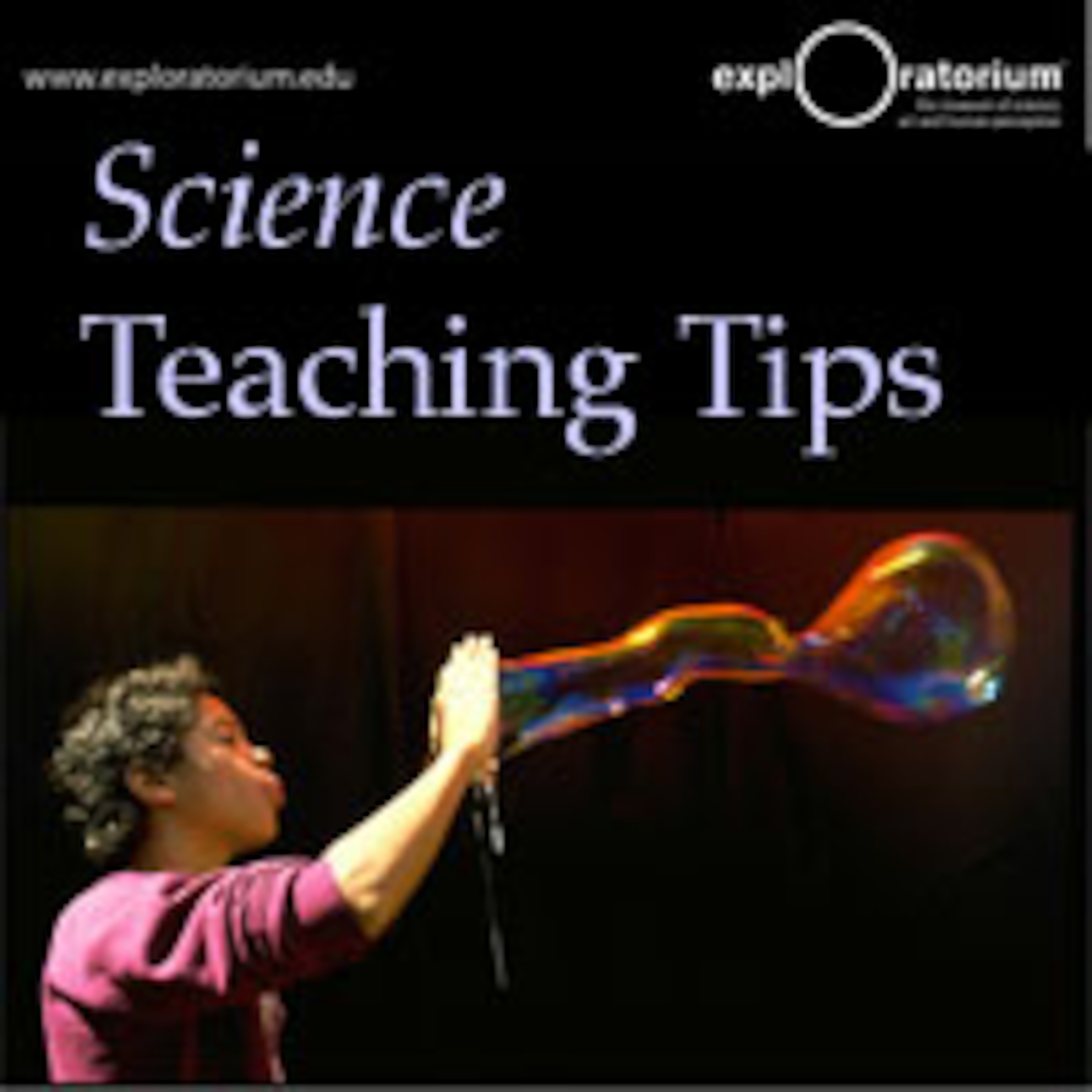Shows

Institute for Classical EducationScience Education Research and Reform at the College Level with Dr. Stephanie ChasteenScience Education Research and Reform at the College Level with Dr. Stephanie Chasteen
2021-04-131h 06
Recent Teacher Institute Podcasts from the ExploratoriumFind That SoundTake a little sound quiz with our host, Stephanie Chasteen, and learn something about how our brains locate sounds.
2010-04-1400 min
Science Teaching TipsScience Teaching Tips is dead. Long live Science Teaching Tips!The final episode of Science Teaching Tips has been posted. But don't despair! They've been given new life (and a new webhome) over at http://exploratorium.edu/ti/podcasts. Check out the new location, it's all spiffy and snazzy, and listen to all the great episodes of the compiled wisdom of the Exploratorium's Teacher Institute. Enjoy!
2009-03-3002 min
Science Teaching Tips69. The World's Cheapest ElectroscopeDying to know whether something’s positively or negatively charged? TI staff educator Modesto Tamez explains an easy – and dirt cheap – way to probe the electric charge of the world.
2009-03-3007 min
Science Teaching Tips68 - Body MetricsStudents really struggle with the metric system. TI staff educator Lori Lambertson tells us how she helps students get a handle on what the units really mean.
2009-02-2106 min
Science Teaching Tips67. Let's Find Out!Teaching isn’t just work, it’s a lot of fun. Staff scientist Thomas Humphrey quickly figured out he didn’t have the answer to every question in the classroom, and that’s the fun of it.
2009-02-1004 min
Science Teaching Tips66. That's a good question!TI staff biologist Karen Kalumuck describes how she tries not to answer every question that’s asked during a class. Instead, she guides her students to discover ideas for themselves.
Karen Kalumuck’s Web site: philo.exploratorium.edu/karenk
2009-01-2307 min
Science Teaching Tips65. Revising the Rainbow.What is indigo anyway? Staff physicist Paul Doherty tells the story behind ROYGBIV, and how he’d like to change that standard palette.
Paul Doherty’s Web site: www.exo.net/~pauld
2009-01-1007 min
Science Teaching Tips64. When the Moon Hits Your EyeWhat coin would just barely cover the full moon? You may be surprised. TI director (and recovering astrophysicist) Linda Shore explains how our brains distort the actual size of the moon.
2009-01-0307 min
Science Teaching Tips63. Teaching abroadA veteran teacher describes her first year of teaching—in Guatamala. She faced many, many challenges, but she stuck it out and has been teaching for 20 years.
2008-12-2005 min
Science Teaching Tips62. Find that sound!Take a little sound quiz with our host, Stephanie Chasteen, and learn something about how our brains locate sounds.
Stereo
Find That Sound activity: http://exploratorium.us/listen/activities/dean/localize/lg_dean_localize.php
Stephanie Chasteen’s Web site: www.exo.net/~drsteph
2008-12-1205 min
Science Teaching Tips61. Follow the bouncing ball!Have you ever really listened to a ball bounce? Exploratorium staff physicist Thomas Humphrey describes the elegant mathematics of a bouncing ball.
2008-12-0509 min
Science Teaching Tips60. The Last StrawDespite my better judgment, I invite TI staff educator Eric Muller to do one more set of activities—several things you can do with soda straws.
Holding Charge activity: www.exo.net/~emuller/activities/Holding%20Charge.pdf
More of Eric Muller’s activities: www.exo.net/~emuller
2008-12-0206 min
Science Teaching Tips59. Mini labsTI teacher coach Zeke Kossover explains how he uses short, focused lab activities to really get concepts across to his students.
2008-11-2409 min
Science Teaching Tips58. Hey neat! The importance of "provocacion"Do your lessons sometimes fall flat? Staff educator Modesto Tamez explains how to be a good salesperson and get students engaged.
2008-11-0705 min
Science Teaching Tips57. The drama of the immune systemExploratorium staff educator Tory Brady performs a bit of theater, demonstrating the roles of the star players in the immune system.
2008-10-2413 min
Science Teaching Tips56. Seeing the lightNewton wasn’t really ready to believe that light was a wave, and so he didn’t see what was in front of his eyes. Staff physicist Paul Doherty tells how to do the same experiment that Newton did back in the 1650s to see the wave nature of light.
Paul Doherty’s Web site: www.exo.net/~pauld
2008-10-1704 min
Science Teaching Tips55. Then YOU measure it!Put kids’ skepticism to work! Children’s book author David Schwartz explains how a class disagreed with the numbers in one of his math books, and set out to prove him wrong!
David Schwartz’s Web site: www.davidschwartz.com
2008-10-1110 min
Science Teaching Tips54. Whack a StackExploratorium staff educator Don Rathjen makes some noise with this activity about Newton’s laws.
Whack-a-Stack activity: http://www.raft.net/ideas/Whack%20a%20Stack.pdf
The Old Tablecloth Trick (related):
http://www.raft.net/ideas/Old%20Tablecloth%20Trick.pdf
More of Don Rathjen’s activities: www.exo.net/~donr
2008-10-0304 min
Science Teaching Tips53. Running hot and coldExploratorium staff physicist Thomas Humphrey explains what temperature and color have to do with one another.
2008-09-2605 min
Science Teaching Tips52. Huh?When this chemistry teacher entered her portable classroom as a new teacher, she was fresh from West Africa—and there was a lot she didn’t know.
2008-09-2204 min
Science Teaching Tips51. Nobody's Ever Taught You AnythingNobody can really teach you anything—rather, you have to learn it for yourself. So how can you help your students understand science? TI staff educator Modesto Tamez shares some thoughts about helping students make ideas their own.
2008-09-1505 min
Science Teaching Tips50. Whirled musicGeeks have strange hobbies. Staff physicist Paul Doherty plays the corrugated plastic tube, also known as a “whirly,” and explains the surprising science behind the sound.
The science of whirlies: www.exo.net/~pauld/summer_institute/summer_day13music/Whirly.html and http://isaac.exploratorium.edu/~pauld/activities/AAAS/aaas2001.html
2008-09-0508 min
Science Teaching Tips49. Hey, batter batter!Exploratorium graphic artist David Barker describes the physics of baseball bats, and makes some sweet music in the process! Exploratorium’s science of baseball: www.exploratorium.edu/baseball
2008-08-2908 min
Science Teaching Tips48. Ooh you make my motor runStaff educator Modesto Tamez tells how he gets students exploring electromagnets, a great preparation for making an electric motor. Stripped Down Motor activity: www.exploratorium.edu/snacks/stripped_down_motor.html
2008-08-2208 min
Science Teaching Tips47. Groovy Sounds (Make your own phonograph)TI staff educator Eric Muller explains how to make your own record player!
Groovy Sounds activity: www.exo.net/~emuller/activities/Groovy%20Sounds.pdf
More of Eric Muller’s activities: www.exo.net/~emuller
2008-08-1509 min
Science Teaching Tips46. If you could hop like a frog...It can be hard to make ideas about size and scale relevant to students’ lives. Children’s book author David Schwartz explains a series of neat real-world comparisons from his book that really get the concepts across.
David Schwartz’s Web site: www.davidschwartz.com
2008-08-0309 min
Science Teaching Tips45. Which is closest? Pluto or the stars?Which is farthest away from the earth, the stars or Pluto? The answer may be obvious to you, but a lot of people get this wrong. Listen to TI director Linda Shore as she presents a little survey about how things are arranged in the heavens—and explains what the surprising results mean.
2008-07-2607 min
Science Teaching Tips44. That sounds good!Exploratorium staff physicist Thomas Humphrey divulges a clever way to measure the speed of sound, and he explains how he’s used that information to measure things in the world.
2008-07-2109 min
Science Teaching Tips43. The value of supportA veteran teacher tells how much he was helped in his first year of teaching by an unusually supportive department.
2008-07-1305 min
Science Teaching Tips42. Electrifying IdeasThe ancient Greeks knew about magnets, and they knew about electricity, too. But it wasn’t until the nineteenth century that a connection between the two was discovered. Staff physicist Paul Doherty tells the story of how a professor made the connection . . . which led to modern motors.
Paul Doherty’s Web site: www.exo.net/~pauld
2008-07-1305 min
Science Teaching TipsEpisode 41 - It's all a Matter of TasteTI staff biologist Karen Kalumuck busts some of the myths about taste, and presents a few fun activities for the classroom.
This activity is from the Exploratorium’s Human Body Explorations: http://explo.stores.yahoo.net/humbodex.html
The Nose Knows activity: www.exploratorium.edu/ti/human_body/nose.html
More activities by Karen Kalumuck: http://philo.exploratorium.edu/karenk
2008-06-2707 min
Science Teaching Tips40. Take it from the TopA stack of blocks seems to defy gravity in this activity by Exploratorium staff educator Don Rathjen.
Take It from the Top activity: http://www.exploratorium.edu/snacks/take_it_from_the_top/index.html
More of Don Rathjen’s activities: www.exo.net/~donr
2008-06-2006 min
Science Teaching TipsEpisode 39: A Tale of AdjustmentA veteran teacher describes his first year of teaching, and the myriad things he adjusted to while he learned the profession he loves.
2008-06-1304 min
Science Teaching TipsEpisode 38: Going to the DogsWhat do polarized sunglasses have to do with dog urine? Listen to this curious story from staff physicist Paul Doherty.
Paul Doherty’s Web site: www.exo.net/~pauld
2008-06-0404 min
Science Teaching Tips37. Scaling Up BarbieSize and scale can be difficult concepts to teach. TI staff educator Lori Lambertson talks us through one of her favorite activities, using one of her favorite dolls—Barbie.
2008-05-1606 min
Science Teaching Tips35. When Words Fail YouHow do you give your students the words they need to understand an activity or a topic? TI Staff Educator Modesto Tamez explains his opinion that vocabulary is best given towards the end of a lesson, not at the beginning.
2008-04-1204 min
Science Teaching Tips34. Sound Bytes (Part 2)Our host, Stephanie Chasteen, shares some more fun facts and activities having to do with the science of sound.
Stephanie Chasteen’s Web site: www.exo.net/~drsteph
2008-04-0605 min
Science Teaching Tips33. I Don’t Think SoKids can be pretty skeptical, which can help them to learn more. Children’s book author David Schwartz shares some of the letters from classes who thought they should double-check the numbers in some of his books.
David Schwartz’s Web site: www.davidschwartz.com
2008-03-2106 min
Science Teaching Tips32. The Teaching BoxStaff educator Tory Brady tells you how to make a teaching box—a valuable tool for getting yourself organized to teach a great science unit.
My Science Box (Web site from TI alumna): http://www.mysciencebox.org/node/172
2008-03-1507 min
Science Teaching Tips31. Carbon dioxide - It's a gas!TI staff educator Eric Muller shows me how to carbonate my tongue. Blech!
More of Eric Muller’s activities: www.exo.net/~emuller
2008-03-0704 min
Science Teaching Tips30. You *Can* Take It with YouTI teacher coach Jennifer Paillet explains how to fit in more labs, and get students thinking creatively by using take-home labs.
2008-02-2905 min
Science Teaching Tips29. Private theoriesStudents may come into your classroom with preconceived ideas about how things work. TI director Linda Shore explains why she feels it’s important to explore students’ private theories about the world, and some ways she’s found to do that in her own classrooms.
A Private Universe (from Annenburg Media): http://www.learner.org/resources/series28.html
2008-02-1406 min
Science Teaching Tips28. Size Does MatterExploratorium staff physicist Thomas Humphrey reveals why size does matter, at least in physics.
2008-02-0805 min
Science Teaching Tips28. Size Does MatterExploratorium staff physicist Thomas Humphrey reveals why size does matter, at least in physics.
2008-02-0805 min
Science Teaching Tips27. Why We TeachNeed to remember why you teach? Listen to this incredible story from one of our teacher coaches recalling her first year of teaching.
2008-02-0111 min
Science Teaching TipsHands-on ScienceWhen staff physicist Paul Doherty began to teach, he started by doing lots of demonstrations. But now, he explains, he has students get their hands on the science, which helps them to understand the calculations.
Paul Doherty’s Web site: www.exo.net/~pauld
File: 25-hands-on-science.mp3
2008-01-1805 min
Science Teaching Tips24. Survival GuideIt’s tough for a new teacher to keep up with everything from labs to professional development. TI teacher coach Arlette Manders provides a potpourri of tips on how to make life a little easier.
2008-01-1107 min
Science Teaching Tips23. For the Love of MathTI staff educator Lori Lambertson explains her philosophy of integrating math and science in the classroom, and how she puts it into practice.
2008-01-0308 min
Science Teaching Tips22. Ice ScreamTI staff educator Eric Muller demonstrates a “cool” thing to do with dry ice, and it even relates to the standards!
More of Eric Muller’s activities: www.exo.net/~emuller
2007-12-2104 min
Science Teaching Tips21. How Much IS a Million?Children’s book author David Schwartz shares some creative ways kids and teachers have used his books to look at big numbers.
David Schwartz’s Web site: www.davidschwartz.com
2007-12-1007 min
Science Teaching Tips20. Sound Bytes (Part 1)Our host, Stephanie Chasteen, shares some fun facts and activities having to do with the science of sound.
Stephanie Chasteen’s Web site: www.exo.net/~drsteph
2007-12-0105 min
Science Teaching TipsThat's a Good QuestionTI staff biologist Karen Kalumuck tells us how she tries not to answer every question in the classroom -– instead, she guides her students to discover ideas for themselves.
Karen Kalumuck’s website: http://philo.exploratorium.edu/karenk/
2007-11-1907 min
Science Teaching Tips18. Take it outsideSometimes kids don’t have much experience with nature. TI teacher coach Kim Marie Hansen tells us how she got her inner city students outside and observing the world, by using nature journals.
Sample nature journal page: http://www.exo.net/~drsteph/podcasts/TT_Nature_journals.pdf
2007-10-1505 min
Science Teaching Tips17. Think PositiveGot a tough kid in your class? TI Staff Educator Modesto Tamez tells us a story from his teaching career – a powerful technique that has helped him win over the stubborn, negative students.
2007-10-0803 min
Science Teaching Tips16. Marshmallow Puff TubeNewton’s Laws were never so tasty. Exploratorium staff educator Don Rathjen shows us how to demonstrate ideas about force using a file folder and a marshmallow.
More of Don Rathjen’s activities: http://www.exo.net/~donr/
2007-09-2106 min
Science Teaching Tips15. Lucky Break. First year of teaching story #2.A lucky veteran teacher tells how she got started teaching, with a supportive school and helpful predecessor. This episode is one in a series of several stories of the first time in a difficult profession.
2007-09-1705 min
Science Teaching Tips14 - Through the Looking GlassHow big does a mirror have to be for you to see yourself in it? Exploratorium senior staff scientist Thomas Humphrey describes an activity you can use in your classroom to investigate simple optics.
2007-09-0607 min
Science Teaching Tips13 - How many hairs on my head?Children’s book author David Schwartz (www.davidschwartz.com) tells us how big numbers got him excited about math when he was a kid.
2007-08-2907 min
Science Teaching Tips12 - To coin a phrase...TI staff educator Eric Muller hits me up for change, and then shows us a neat science activity using dry ice. Eric’s website is at http://doscience.com/.
2007-08-0705 min
Science Teaching Tips11 - What’s Your Story?TI teacher coach Carol Murphy talks about the myriad ways she’s used storytelling in her science classes.
2007-07-3108 min
Science Teaching Tips10 - First Year of Teaching (Story #1)Today's story -- a teacher tells of his first year teaching in a tough school district, and a stellar performance in the face of quite extenuating circumstances. This episode is one in a series of several of these funny, sad, touching, and tough stories of the first time in a difficult profession.
2007-07-1107 min
Science Teaching Tips9 - We Won Best Professional Development Podcast!Science Teaching Tips just won "Best Professional Development podcast" from the Podcast for Teachers (http://www.podcastforteachers.org.) In this episode, hear their interview with me, where I talk about why I made this podcast and why I think podcasts can be great professional development for teachers.
2007-07-1113 min
Science Teaching Tips8 - Make a Cuica!Learn how to build a version of a Brazilian instrument called the Cuica, which demonstrates principles of sound. This podcast was created collaboratively in a teacher workshop at the Exploratorium.
2007-04-0505 min
Science Teaching Tips7- Classroom ManagementTI teacher coach Sandra Robbins talks about better classroom management styles.
2007-03-0804 min
Science Teaching Tips6 - Student MisconceptionsTI teacher coach Sandra Robbins touts the merits of a book examining how to address student misconceptions in the science classroom.
2007-03-0704 min
Science Teaching Tips5 - Exponential FoldingTI staff educators Lori Lambertson and Tory Brady explore the math behind the morning paper.
2007-03-0705 min
Science Teaching Tips4 - Sing a Song of ScienceTI teacher coach Rilla Chaney says she's no singer, but she's successfully used songs to teach science concepts in her classroom.
2007-03-0708 min
Science Teaching Tips3 - Stem CellsTI postdoctoral fellow Julie Yu explains what a stem cell is and why they’re important.
2007-03-0703 min
Science Teaching Tips2 - Name That Book!TI staff educator Don Rathjen describes how making up joke book titles, such as “Marine Biology” by C. Star, is a useful teaching tool—and also one of his personal addictions.
2007-03-0704 min
Science Teaching Tips1 - Straw OboeTI staff educator Modesto Tamez explains how to make a simple straw oboe that will bring down the house (and teach good physics!).
2007-03-0704 min